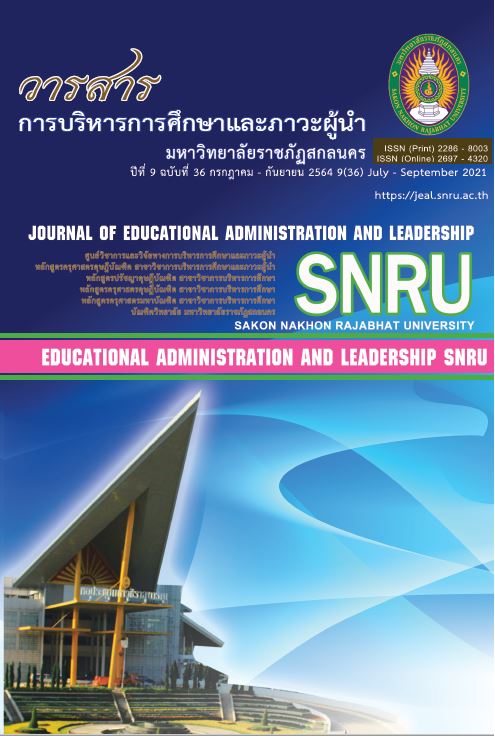

ภาวะผู้นำของผู้บริหารที่ส่งผลต่อประสิทธิผลการบริหารงานในโรงเรียนพระปริยัติธรรม แผนกสามัญศึกษา กลุ่มที่ 8 สังกัดสำนักงานพระพุทธศาสนาแห่งชาติ
Administrators’ Leadership Affecting the Administrative Effectiveness at Phrapariyattidhamma School in the General Education Division Group 8 under the National Office of Buddhism
ผู้แต่ง
นฤมล สุวรรณรงค์, สายันต์ บุญใบ, เยาวลักษณ์ สุตะโคตร
Author
Naruemol Suwannarong, Sayan Boonbai, Yaovalak Sutacort
บทคัดย่อ
การวิจัยครั้งนี้มีความมุ่งหมายเพื่อศึกษาระดับภาวะผู้นำของผู้บริหาร และประสิทธิผลการบริหารงานในโรงเรียน เปรียบเทียบภาวะผู้นำของผู้บริหาร และประสิทธิผลการบริหารงานในโรงเรียน จำแนกตามสถานภาพการดำรงตำแหน่ง ขนาดโรงเรียน และประสบการณ์ในการปฏิบัติงานที่ต่างกัน ศึกษาความสัมพันธ์ของภาวะผู้นำของผู้บริหารและประสิทธิผลการบริหารงานในโรงเรียน ศึกษาอำนาจพยากรณ์ของภาวะผู้นำของผู้บริหารที่ส่งผลต่อประสิทธิผลการบริหารงานในโรงเรียน และหาแนวทางการพัฒนาภาวะผู้นำของผู้บริหารที่ส่งผลต่อประสิทธิผลการบริหารงานในโรงเรียน ตัวอย่าง ได้แก่ ผู้บริหารสถานศึกษา และครูผู้สอน จำนวน 205 รูป / คน จำแนกเป็นผู้บริหารสถานศึกษา จำนวน 84 รูป/ คน และครูผู้สอน จำนวน 121 รูป / คน แยกเป็น ครูพระ จำนวน 44 รูป และครูฆราวาส จำนวน 77 คน เครื่องมือที่ใช้ในการเก็บรวบรวมข้อมูล เป็นแบบสอบถามเกี่ยวกับภาวะผู้นำของผู้บริหาร และประสิทธิผลการบริหารงานในโรงเรียน และแบบสัมภาษณ์แนวทางพัฒนาภาวะผู้นำของผู้บริหารที่ส่งผลต่อประสิทธิผลการบริหารงานในโรงเรียน สถิติที่ใช้ในการวิเคราะห์ข้อมูล ได้แก่ ค่าเฉลี่ย ส่วนเบี่ยงเบนมาตรฐาน การทดสอบที (t - test) ชนิด Independent Samples การทดสอบเอฟ (F - test) การวิเคราะห์ความแปรปรวนทางเดียว (One - way ANOVA) ค่าสัมประสิทธิ์สหสัมพันธ์อย่างง่ายของเพียร์สัน (Pearson Product - Moment Correlation Coefficient) และการวิเคราะห์การถดถอยพหุคูณแต่ละขั้นตอน (Stepwise Multiple Regression analysis)
ผลการวิจัย พบว่า
1. ภาวะผู้นำของผู้บริหาร โดยรวมและรายด้านอยู่ในระดับมาก
2. ประสิทธิผลการบริหารงานในโรงเรียน โดยรวมและรายด้านอยู่ในระดับมาก
3. ภาวะผู้นำของผู้บริหาร ตามความคิดเห็นของผู้บริหารและครูผู้สอน จำแนกตามสถานภาพการดำรงตำแหน่ง โดยรวมแตกต่างกันอย่างมีนัยสำคัญทางสถิติที่ระดับ .01 แต่จำแนกตามขนาดโรงเรียนและประสบการณ์ในการปฏิบัติงาน โดยรวมไม่แตกต่างกัน
4. ประสิทธิผลการบริหารงานในโรงเรียน ตามความคิดเห็นของผู้บริหารและครูผู้สอน จำแนกตามสถานภาพการดำรงตำแหน่ง โดยรวมแตกต่างกันอย่างมีนัยสำคัญทางสถิติที่ระดับ .01 แต่จำแนกตามขนาดโรงเรียนและประสบการณ์ในการปฏิบัติงาน โดยรวมไม่แตกต่างกัน
5. ภาวะผู้นำของผู้บริหารกับประสิทธิผลการบริหารงานในโรงเรียน โดยรวมพบว่า มีความสัมพันธ์ทางบวก อยู่ในระดับสูง อย่างมีนัยสำคัญทางสถิติที่ระดับ .01
6. ภาวะผู้นำของผู้บริหาร จำนวน 2 ด้าน ที่สามารถพยากรณ์ประสิทธิผลการบริหารงานในโรงเรียนได้ โดยมีนัยสำคัญทางสถิติที่ระดับ .01 คือ ภาวะผู้นำแบบมุ่งความสัมพันธ์ (X2) และภาวะผู้นำทางวิชาการ (X5) สามารถเขียนสมการวิเคราะห์การถดถอยพหุคูณ ในรูปคะแนนดิบ ได้ดังนี้ Y’ = 1.50 + 0.33 X2 + 0.32 X5 และสามารถเขียนสมการวิเคราะห์การถดถอยในรูปคะแนนมาตรฐาน ได้ดังนี้ Z’ = 0.42 ZX2 + 0.41 ZX5
7. แนวทางการพัฒนาภาวะผู้นำของผู้บริหารที่ส่งผลต่อประสิทธิผลการบริหารงานในโรงเรียน เสนอแนะไว้ 4 ด้าน ประกอบด้วย ด้านภาวะผู้นำแบบมุ่งความสัมพันธ์ ผู้บริหารควรสร้างแรงจูงใจที่ดีให้ครูได้ใช้ความรู้ความสามารถในการปฏิบัติงานอย่างเต็มความสามารถ, ด้านภาวะผู้นำแบบมีส่วนร่วม ผู้บริหารควรเปิดโอกาสให้ครูมีส่วนร่วมในการวางแผน การติดตามประเมินผลการปฏิบัติงาน และชื่นชมความสำเร็จจากการปฏิบัติงาน, ด้านภาวะผู้นำการเปลี่ยนแปลง ผู้บริหารควรส่งเสริมสนับสนุนให้ครูและบุคลากรทางการศึกษาแสวงหาความรู้และเทคนิควิธีการใหม่ ๆ มาใช้ในการจัดการเรียนรู้อย่างต่อเนื่อง, ด้านภาวะผู้นำทางวิชาการ ผู้บริหารควรส่งเสริมให้มรการนิเทศ กำกับติดตามและประเมินผลการจัดการเรียนการสอนเพื่อการพัฒนาการเรียนการสอนให้มีประสิทธิภาพ
Abstract
The purposes of this research were: 1) to examine the level of administrators’ leadership and the administrative effectiveness at Phrapariyattidhamma School in the General Education Division Group 8 under the National Office of Buddhism; 2) to compare administrators’ leadership and the administrative effectiveness as perceived by school administrators and teachers with different positions, school sizes, and work experience; 3) to explore the relationship between administrators’ leadership and the administrative effectiveness; 4) to identify the predictive power of administrators’ leadership affecting the administrative effectiveness; and 5) to establish the guidelines for developing administrators’ leadership affecting the administrative effectiveness. The samples consisted of 84 school administrators, and 121 teachers with 44 monk teachers and 77 lay teachers, yielding a total of 205 participants working at Phrapariyattidhamma School in the General Education Division Group 8 under the National Office of Buddhism in the 2019 academic year. The instrument for data collection was a set of questionnaires and interview forms. The statistics for data analysis were mean, standard deviation, t-test for Independent Samples, One-Way ANOVA, Pearson product-moment correlation coefficient, and Stepwise multiple regression analysis
The findings were as follows:
1. The administrators’ leadership as a whole and in each aspect was at a high level, while the school’s administrative effectiveness as a whole and in each aspect was at a high level.
2. The administrators’ leadership and the administrative effectiveness, as perceived by participants with different positions, as a whole differed at the .01 level of significance, but there were not differences in terms of school sizes and work experience overall.
3. The administrators’ leadership and the administrative effectiveness had a positive relationship at the .01 level of significance overall.
4. The administrators’ leadership comprised four aspects, which were able to predict the administrative effectiveness as a whole and in each aspect at a statistical significance of .01. The said factors comprised: relationship-oriented leadership (X2), and instructional leadership (X5), and participative leadership (X3). The factor which was at the .05 level of significance consisted of transformational leadership (X4). The regression equation of raw scores and standard scores could be written as follows: Y’ = 1.50 + 0.33 X2 + 0.32 X5 + 0.30 X3 +0.23 X4 Z’ = 0.42 ZX2 + 0.41 ZX5 + 0.29 ZX3 + 0.23 ZX4
5. Guidelines for developing administrators’ leadership affecting the administrative effectiveness proposed four aspects needing improvement: 1) relationship - oriented leadership, in terms of building good motivation for teachers to perform to the best of their abilities; 2) participative leadership, in terms of offering opportunities for teacher participation in school planning, performance measurement, and evaluation, and work appraisals; 3) transformational leadership, in terms of encouraging and supporting teachers and educators to seek for new information and approaches into practice continuously; and 4) instructional leadership, in terms of supporting supervision, monitoring and evaluation of instruction management for effective teaching and learning
คำสำคัญ
ภาวะผู้นำของผู้บริหาร, ประสิทธิผลการบริหารงานในโรงเรียนKeyword
Administrators Leadership, School EffectivenessNotice: Undefined variable: dataSet in /var/www/html/ArticleView.php on line 116
Notice: Trying to access array offset on value of type null in /var/www/html/ArticleView.php on line 116
บทความทุกบทความเป็นลิขสิทธิ์ของ
Notice: Undefined variable: dataSet in /var/www/html/ArticleView.php on line 116
Notice: Trying to access array offset on value of type null in /var/www/html/ArticleView.php on line 116
เท่านั้น
กำลังออนไลน์: 13
วันนี้: 43
เมื่อวานนี้: 2,282
จำนวนครั้งการเข้าชม: 1,259,646
อาคารบัณฑิตวิทยาลัย ชั้น 2 ตำบลธาตุเชิงชุม อำเภอเมือง จังหวัดสกลนคร 47000
โทร/
แฟกซ์ 0-4297-0093
บรรณาธิการ: รองศาสตราจารย์ ดร.ไชยา ภาวะบุตร
ติดต่อ/สอบถาม: นายธีรเวทย์ เพียรธัญญกรณ์
โทร: 0-4297-0093